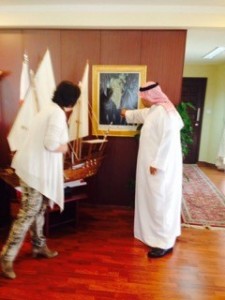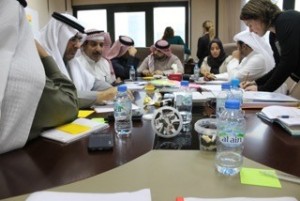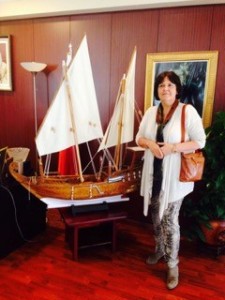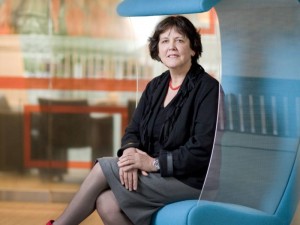“Legal capacity building is about exchanging expertise with your local counterpart in another country. Subsequently, that country should mirror and reflect these practices and also translate them into its own context and culture. As an expert, you are reflecting on the situation at home and in the project country with an alertness in everything you do.” Rosa H.M. Jansen is the first legal capacity building expert working on projects abroad to be featured in a series of articles about CILC. In it she will share her insights and wisdom on the ‘core business’ of CILC: legal capacity building and what it should and should not look like. For this, she is able to draw on decades of experience in the Netherlands as a judge, as President of the board of directors of the training and study centre for the Dutch judiciary, as a former CILC board member, and as a legal capacity building expert in various regions across the globe.
Interview by Marjolein C. Groot, 1 June 2015
Exchanging expertise
To Jansen, legal capacity building is about exchanging legal expertise (“craftsmanship”) and discussing the organisation surrounding it. In her view, by exchanging such expertise with your local counterpart, despite the fact that you do not necessarily share the same law codes or can read each other’s legislation, one learns much more about what it means to be a judge, what integrity and ethical values mean, and how to act during a court hearing. Jansen: “For example, if you discuss a family case or a criminal case with a Mongolian judge, just as if you were doctors discussing a surgery, we will have the same type of experience. Perhaps your surgical instruments or laws are different or more advanced than mine, something which you could explain to me, but that does not make any real difference. What counts in the end is how you are performing your role as a doctor or judge. In the end, you speak the same language as your colleague, because you are all judicial professionals. It is very easy to go into things in-depth between professional colleagues.”
Software as opposed to hardware
In this light, according to Jansen, it is of less use to provide your local counterpart with an entire law book. “The cultural elements surrounding a specific law book might not fit the context of the aid receiving country. Certain issues that might be self-evident to us, may actually be very much specific to our culture. A similar thing happens when you discuss the selection process of judges. In the Netherlands, it’s very common to use psychological tests for this. However, these tests can come across as very threatening in other countries. Furthermore, you cannot simply copy our tests. You have to develop them in the country itself. Culture plays a very important role in these selection tests. At most, you can explain the working of the tests and exchange your experiences with them.”



Jansen recalls a legal capacity building project she recently undertook in Bahrain, focusing on the initial training of judges, prosecutors and court clerks. “In Bahrain, they were excellent at mirroring and reflecting on our knowledge and used exactly what they needed from it in their own country. They asked very specific questions and did not directly copy our system, but translated it into their own context as a relative small country of about one million inhabitants, with perhaps only ten candidate judges to be trained annually.”
Jansen has participated in numerous large and smaller projects with CILC as a legal capacity building expert, but also with the United Nations Development Programme, the American Bar Association, the World Bank, the European Commission and the Council of Europe. The list of countries that she has visited as an expert is long and quite varied, spanning contexts and cultures as diverse as Albania, Ukraine, Mongolia, Bahrain, Morocco, Rwanda, Yemen and Indonesia. During these missions, Jansen has gained deep insight into what legal capacity building involves, shaping her vision on how it should be carried out ideally.
Legal capacity building: a constant reflection on your own system
Jansen says that in legal capacity building, it’s all about the reflection on the situation at home and in the project country. “To start with, there’s a reflection on my work as a judge. For example, some colleagues in project countries asked me whether in my country the judiciary would at times receive requests from people trying to influence its decision making. Fortunately, in the Dutch judiciary I have never received this kind of request. However, there’s always a risk and one should be aware of this risk. One time it may be a minister, another time the Parliament.” Jansen is always alert to these kinds of things when working in a project country.  “When I have noticed a minister becoming involved in a case or removing or replacing people within the judiciary to very remote jurisdictions, upon my return in the Netherlands and when studying our legislation and actions, I am much more critical, knowing that our legislation is specifically designed to take into account circumstances when things are not agreed upon. Another important question is always the way we allocate cases to judges, especially relating to the way judges could be influenced by the outside world.”
“When I have noticed a minister becoming involved in a case or removing or replacing people within the judiciary to very remote jurisdictions, upon my return in the Netherlands and when studying our legislation and actions, I am much more critical, knowing that our legislation is specifically designed to take into account circumstances when things are not agreed upon. Another important question is always the way we allocate cases to judges, especially relating to the way judges could be influenced by the outside world.”
Currently, Jansen is the President of chairs the Board of Directors of the Studiecentrum Rechtspleging (SSR), the training and study centre for the judiciary in Utrecht, the Netherlands. This is a body consisting of a representative from the judiciary (Jansen) and one from the public prosecution service. Both representatives are seconded from their actual positions; before taking up this position at SSR, Jansen was acting president of the Utrecht court. When time allows, Jansen still works as a judge, dealing with criminal law cases, in order to keep abreast of the latest developments in the field.
“I am interested in what people do and where they find their drive. To me, the administration of justice is a matter of finding meaning. When you decide to join the judiciary, you are not choosing it for the monetary reward, you really choose it because you believe that the administration of justice and the rule of law constitutes something essential for society, that it will lift us as human beings to a higher level. If that is what’s in your mind and you envisage opportunities to propagate this thought in a country such as the Netherlands, with its relative wealth and where everyone can live a decent life, in my opinion, it’s an obligation to do so.”
Once CILC, always CILC
Jansen is a so-called career judge who joined the judiciary at an early stage in her career through its initial training programme (Rechterlijke ambtenaar in opleiding, raio). She has never left the judiciary but has combined her work as a judge with numerous other functions related to the judiciary. Before taking up her current position at SSR, Jansen worked at courts in Arnhem, The Hague, Amsterdam and Utrecht, respectively. When Jansen was a newly appointed judge, she worked both as a judge and at the SSR as a ‘programme leader civil and general’. In that latter function, she came in contact with the first CILC director and later joined CILC projects in Albania and Mongolia, followed by numerous other projects. Subsequently, Jansen was on the CILC board for several years and, like many other experts, established a bond for life with the organisation. According to Jansen: “Once CILC, always CILC.”
Legal capacity building at work
Jansen explains the various steps in her work as a legal capacity building expert. “When you go on a mission as an expert, the Terms of References (ToR’s) established by the donor will function as your initial roadmap. You will explore the project’s feasibility on the ground and perhaps slightly edit the ToR’s in your first mission. You will also decide which type of aid you can deliver and start working together with a couple of other experts, all focusing on various parts of legal capacity building. You need to find your right counterparts, and in a very short time you have to identify the needs and develop a plan of implementation. Often recipients are used to being given a budget, whereas the Netherlands often only provides them with assistance in kind, not cash.” Ideally, Jansen notes, there should not only be an evaluation upon completion of the project, but also another one three or more years after the experts have left, to determine what has happened to the project.
Variety of legal capacity building projects
There is a huge variety of legal capacity building projects and locations where they are implemented. Sometimes they are in the European Union, for example with the accession of new member states, or in African or Arabic countries, etc. Jansen: “Initially, this started off as development aid, but at some point you are really working together, with your counterpart, on a co-production. This means that you are strongly connected to project, country and people.” Often, obtaining or the continuation of project funding turns out to be a problem and at some point, projects do end. “When I see images of Yemen on television these days, it really touches my heart and makes me wonder where those people we worked with on legal capacity building projects are now. You have worked together so intensively that, one way or the other, you stay connected to a country. ”
Fertile soil and receptive counterparts
In order for a project to be successful, Jansen underlines the need for a strong base of fertile soil and some political stability in a country before one should engage with it. In addition, good counterparts are crucial. “It all begins with people. People who really want to achieve something in their country. The presence of ambition inside a country, despite having to start entirely from scratch, to want to achieve something.” Jansen perceives this ambition as a seed around which people can be provided with assistance and that can grow into something substantial. “It’s therefore crucial that you invest a lot of energy in selecting the right counterparts. And CILC does an excellent job on this. It is great to see that with some investment, you can find these people in every country and come to results.”

Jansen recalls a CILC project in Yemen which illustrates this need for good partners, in combination with sufficient funding for a project to be taken over and continued by the local counterpart (and a strongly engaged Dutch embassy). “We had good partners, but at some point the funding ran out. We worked there with pilot courts and not only assisted with training, but were also engaged in the practical development of the courts. Two higher courts and two courts of first instance had been selected and we really studied the context and explored how we could best assist these courts. We provided them with advice about their set-up, management development, human resources development and gender practices, since we aspired to give women a role in it too: we wanted real development of people and education. Eventually, after several years of cooperation, one could witness a court grow and blossom. A wonderful achievement for a small country such as ours. For this project, the presence of a CILC expert combined with a local expert was essential. Good knowledge of culture in this country was very important. It opened the door to the way it should be done.”
Large donor countries always envisage implementing their own system, for example incorporating a jury, a training model and/or a file system. However, the available funding for projects coming from the Netherlands is always limited. This forces us to cooperate with other donor countries after having first determined what projects they are involved in. Jansen:
“Sometimes a lot of planes full with foreign experts have already arrived in a country, all engaged in projects that focus on the same topics. If I remember correctly, in the past in Albania we were the tenth nation entering the country to teach human rights to its judiciary. I think that it is important that the various donors also work together and that the receiving country draws up its own long-term master plan. In this way, you can really follow the right steps and achieve sustainability. My own experience is that this is difficult to do, because a lot of donors want to put their own stamp on countries and make themselves visible.”
Keep the receiving country in the driver’s seat
 In Jansen’s view, it’s crucial to urge an aid-receiving country to have a clear vision for its development and as a donor to try to prevent the spoiling of budgets. “Convince the country that it makes sense to plant and harvest.” She underlines that the ownership, the lead, should be with the aid-receiving country: they are the ones that have to continue after a project is completed; the experts are only involved as advisors and helpers. Another thing which is important to Jansen is that one should not send in truckloads of money. “It should be an amount that the country eventually can process and absorb, in balance with what they want to achieve. The Netherlands is pretty good at this. Obviously, we are not big money givers, our aid is always very focused and coherent, and determined in cooperation with the recipient country.”
In Jansen’s view, it’s crucial to urge an aid-receiving country to have a clear vision for its development and as a donor to try to prevent the spoiling of budgets. “Convince the country that it makes sense to plant and harvest.” She underlines that the ownership, the lead, should be with the aid-receiving country: they are the ones that have to continue after a project is completed; the experts are only involved as advisors and helpers. Another thing which is important to Jansen is that one should not send in truckloads of money. “It should be an amount that the country eventually can process and absorb, in balance with what they want to achieve. The Netherlands is pretty good at this. Obviously, we are not big money givers, our aid is always very focused and coherent, and determined in cooperation with the recipient country.”






